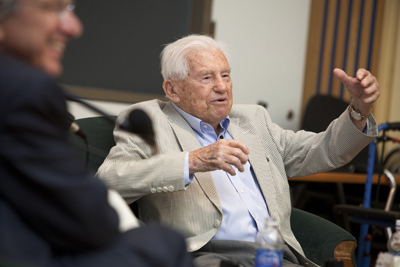Mike Abrams, at 100, reflects on a life in letters
By Daniel Aloi

Class of 1916 Professor Emeritus M.H. "Mike" Abrams reflected on his long career and a life in letters during a two-day public celebration organized by the Department of English in honor of his 100th birthday, July 23.
Abrams spoke with his trademark wit and candor in "A Conversation with M.H. Abrams," held before a full house in Goldwin Smith Hall's Hollis E. Cornell Auditorium the afternoon of July 21. The event featured an introduction by President David Skorton and remarks from Jonathan Culler, the Class of 1916 Professor of English; Geoffrey Harpham, director of the National Humanities Center; and Donald Lamm, chairman emeritus of publisher W.W. Norton.
Abrams helped shape literary studies over more than a generation as general editor, through seven editions, of "The Norton Anthology of English Literature" from 1962 to 2000. From its inception, the widely used anthology evolved constantly under Abrams' 38-year stewardship, reflecting the preferences and usage habits of teachers and students.
He also served as lead author from 1957 to 2010 of another Norton bestseller, "The Glossary of Literary Terms." His books include the acclaimed 1953 history of criticism, "The Mirror and the Lamp: Romantic Theory and the Critical Tradition," 25th on the Modern Library's list of 100 best nonfiction books of the 20th century.
Culler praised Abrams' scholarly influence on the theory of poetry, intellectual history and literary criticism -- and, closer to home, cited "Mike's calming influence" on the Department of English, where he taught from 1945 to 1983 alongside such peers as Vladimir Nabokov, Morris Bishop, Max Black, Harold Thompson and Norman Malcolm.
"He insisted that we reward work well done, and he was adroit at avoiding administration," said Culler, who also related the friendly literary jousting that occurred between Abrams and poet A.R. "Archie" Ammons; each would leave teasing original verse in the other's faculty mailbox.
Harpham, who collaborated with Abrams on "The Glossary of Literary Terms," marveled at Abrams' achievement with the glossary and the Norton Anthology, "each documenting the turbulence of an incredible 50 years," during which new criticism and new literary forms flourished.
The entries written and edited by Abrams "are miracles of compression, lucidity and fairness. These are among the facts of the field," he said.
Culler asked Abrams about his time studying with poet and critic I.A. Richards at Cambridge University in the 1930s. Richards corresponded with "the major poets of the time -- Yeats, Eliot, Longfellow -- who would send him their work and ask for his comments," Abrams said. "There were always new poems on the mantelpiece, and he would sometimes say that I could read them."
Harpham inquired about how Abrams viewed changing trends in theory from the '50s to the '70s, such as the emergence of deconstruction.
Abrams said that while he may have had "the reputation of a curmudgeon, who had negative things to say about every major new movement, I was very much in favor of novelty and innovation in literary studies." Deconstruction, he said, "meant literary studies were alive!"
On July 22, an "Open Mike for Mike" at the A.D. White House featured tributes from friends, colleagues and former students (including literary critic Harold Bloom '51, who sent a video message), and Abrams lectured on "The Fourth Dimension of a Poem" in Hollis E. Cornell Auditorium. Abrams' forthcoming new book, "The Fourth Dimension of a Poem and Other Essays," explores the art and the physical process of reading poetry, the focus of many of his lectures and speeches in recent years.
Media Contact
Get Cornell news delivered right to your inbox.
Subscribe